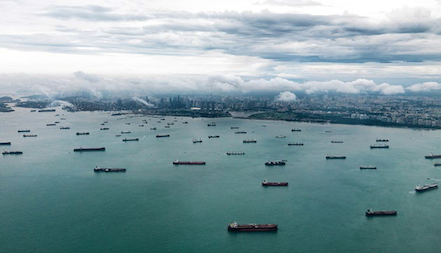Singapore backs IMO to lead global green agenda for shipping

In the week where European politicians voted in favour of going their own way when it comes to regulating shipping’s emissions, a webinar convened by the International Maritime Organization (IMO) and Singaporean authorities yesterday preached the positives of a global, collaborative approach to the industry’s biggest long-term challenge.
The IMO secretary-general, Kitack Lim, and a host of Singapore government ministers and senior administrators dialled in for the Future of Shipping: Decarbonisation webinar.
Lim, anxious for his UN body to continue to lead shipping’s green agenda, said: “IMO is stepping up its efforts to act as a global forum and promoter in R&D in zero carbon marine fuels, bringing together interested stakeholders from public and private sectors, and also private and development banks and other potential donors around the world.”
We cannot leave this historic human endeavour to a patchwork of individual efforts
To co-ordinate and spur global efforts, the IMO and Singapore yesterday introduced NextGEN, a concept for a collaborative global ecosystem of maritime decarbonisation initiatives. NextGEN will facilitate information sharing on decarbonisation initiatives across stakeholders such as IMO member states, industry and academia, identify opportunities and gaps for decarbonisation in the global shipping ecosystem, and create networks and platforms for collaboration.
Among the panellists was Andreas Sohmen-Pao, the chairman of Singapore’s shipowner BW Group, who also serves as co-chair of Singapore’s International Advisory Panel on Maritime Decarbonisation. Sohmen-Pao, who has been a strong backer of a carbon levy for shipping for a number of years, hit out at the inherent risks of Europe deciding to go its own way, putting the industry into the EU’s carbon trading scheme.
“It’s very difficult for the industry if we have this patchwork legislation,” Sohmen-Pau said, echoing comments made earlier in the webinar by Ong Ye Kung, Singapore’s minister of transport who made clear the republic’s strong backing for the UN agency as arbitrator of the industry’s green regulations.
“We cannot leave this historic human endeavour to a patchwork of individual efforts. The IMO’s leadership is needed to harness the collective will of the maritime community,” Ong said.
BW’s Sohmen-Pao went on to discuss what was needed for a global, predictable carbon levy, hitting out at the huge fluctuations seen in the European carbon trading scheme to date.
The European Parliament voted on Tuesday in favour of including greenhouse gas emissions from shipping in the European Union’s carbon market from 2022, potentially one of the biggest rule changes to hit the industry for years.
EU politicians said the bloc’s carbon market should be expanded to include emissions from voyages within Europe, as well as international trips which start or finish in an EU port, forcing owners to buy EU carbon permits to cover these emissions.
The European move has been attacked by many shipping organisations, while being lauded by a host of environmental NGOs.
INTERTANKO’s managing director Katharina Stanzel said the European decision could undermine the efforts taken by IMO under its strategy to reduce greenhouse gas emissions from international shipping.
Washington-based container shipping lobbying group, the World Shipping Council (WSC), has also criticised the EU’s bid to lead shipping’s green agenda.
“Ironically, far from galvanising efforts in the IMO to implement global measures to curb CO2 emissions, an EU ETS is more likely to prevent a global solution. It is unlikely that a government that has set up its own revenue-generating emissions system will dismantle it in favour of a global one. The EU wants to lead the effort to decarbonise shipping, and that leadership needs to be channelled through the IMO, which is the only place where a global solution can be reached,” WSC president and CEO John Butler said last week.
Applauding the European Parliament vote, Faïg Abbasov, shipping programme manager at NGO Transport & Environment, commented earlier this week: “The parliament is tired of inaction in the face of steadily rising shipping emissions. This is a clear signal to EU president von der Leyen that the EU’s more ambitious 2030 climate target must apply to maritime emissions too and that ships must pay for all of their pollution in the EU carbon market.”

My huge thankful gift to Sam Chambers for this Story about the FRONT-RUNNER IMO in reducing the amount of GHG from ships.
My point of view is, that IMO had promised 1997 in Kyoto, to deliver a Timeline with GHG-reducing steps, but IMO has´nt delivered.
In this paper from the IPCC: IPCC-ar4-wg3-chapter5-page 375, you´ll find this “bashing”
5.5.2 Aviation and shipping
In order to reduce emissions from air and marine transport resulting from the combustion of bunker fuels, new policy frameworks need to be developed. Both the ICAO and IMO have studied options for limiting GHG emissions. However, neither has as yet been able to devise a suitable framework for
implementing effective mitigation policies.
So, Sam Chambers, please go on to inform the worldwide media with your results of “ignoring facts” inside the maritime industry, they don´t believe to the power of the wind, but they had started their jobs as ship-owners with the money, earninged with tallships, like CUTTY SARK or PEKING.
There are already lawyers, insurance companies and companies that have shipping as their task. I see that it is a very bad proposal to move it to Singapore.